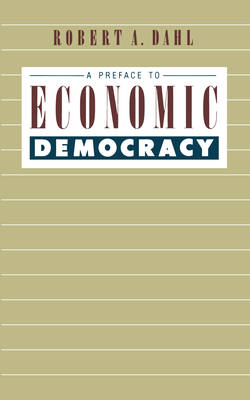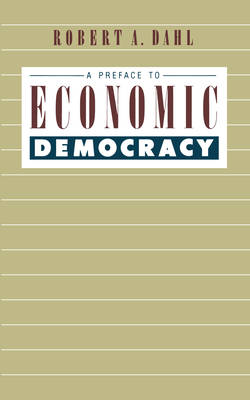
- Afhalen na 1 uur in een winkel met voorraad
- Gratis thuislevering in België vanaf € 30
- Ruim aanbod met 7 miljoen producten
- Afhalen na 1 uur in een winkel met voorraad
- Gratis thuislevering in België vanaf € 30
- Ruim aanbod met 7 miljoen producten
Zoeken
€ 50,95
+ 101 punten
Omschrijving
Tocqueville pessimistically predicted that liberty and equality would be incompatible ideas. Robert Dahl, author of the classic A Preface to Democratic Theory, explores this alleged conflict, particularly in modern American society where differences in ownership and control of corporate enterprises create inequalities in resources among Americans that in turn generate inequality among them as citizens.
Arguing that Americans have misconceived the relation between democracy, private property, and the economic order, the author contends that we can achieve a society of real democracy and political equality without sacrificing liberty by extending democratic principles into the economic order. Although enterprise control by workers violates many conventional political and ideological assumptions of corporate capitalism as well as of state socialism. Dahl presents an empirically informed and philosophically acute defense of "workplace democracy." He argues, in the light of experiences here and abroad, that an economic system of worker-owned and worker-controlled enterprises could provide a much better foundation for democracy, political equality, and liberty than does our present system of corporate capitalism.
Arguing that Americans have misconceived the relation between democracy, private property, and the economic order, the author contends that we can achieve a society of real democracy and political equality without sacrificing liberty by extending democratic principles into the economic order. Although enterprise control by workers violates many conventional political and ideological assumptions of corporate capitalism as well as of state socialism. Dahl presents an empirically informed and philosophically acute defense of "workplace democracy." He argues, in the light of experiences here and abroad, that an economic system of worker-owned and worker-controlled enterprises could provide a much better foundation for democracy, political equality, and liberty than does our present system of corporate capitalism.
Specificaties
Betrokkenen
- Auteur(s):
- Uitgeverij:
Inhoud
- Aantal bladzijden:
- 192
- Taal:
- Engels
- Reeks:
- Reeksnummer:
- nr. 28
Eigenschappen
- Productcode (EAN):
- 9780520058774
- Verschijningsdatum:
- 8/08/1986
- Uitvoering:
- Paperback
- Formaat:
- Trade paperback (VS)
- Afmetingen:
- 123 mm x 201 mm
- Gewicht:
- 226 g

Alleen bij Standaard Boekhandel
+ 101 punten op je klantenkaart van Standaard Boekhandel
Beoordelingen
We publiceren alleen reviews die voldoen aan de voorwaarden voor reviews. Bekijk onze voorwaarden voor reviews.











